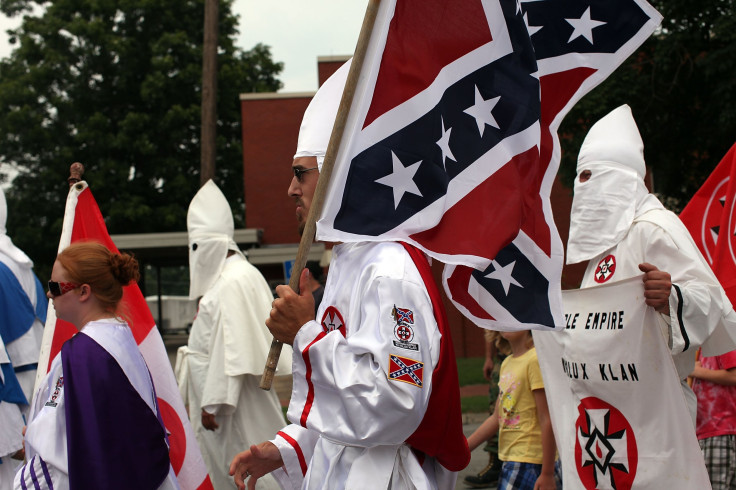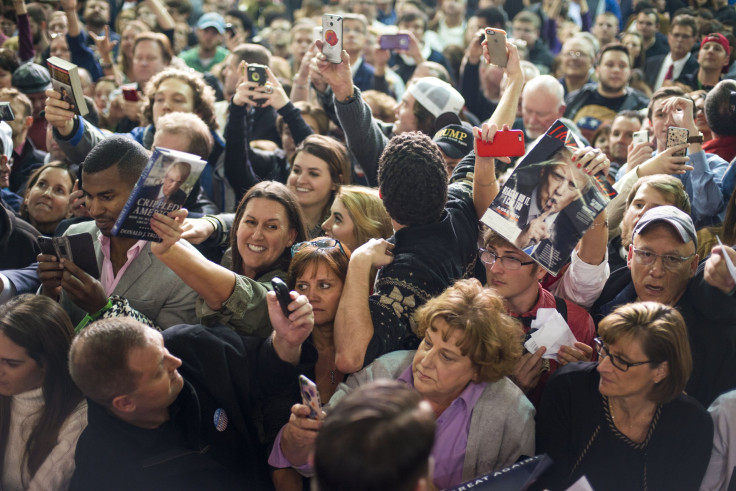White Nationalists Among Donald Trump's Most Enthusiastic Supporters

Jared Taylor is a believer in what he calls “race realism,” a belief system that includes the idea that people are happier when they can live with only members of their race, and that people of color are endangering the majority that white Americans have held for centuries. He has questioned the ability of black people to live in civilized society, and his website, American Renaissance, says one “of the most destructive myths of modern times is that people of all races have the same average intelligence.” Taylor, a white nationalist, is also an enthusiastic supporter of Republican front-runner Donald Trump.
“He is really the first candidate in many years whose policies are not going to kowtow,” Taylor said of Trump. “He has taken a very straightforward position on keeping Muslims out, for example. Can you name a single good consequence of mass Muslim immigration to the United States? I sure can’t!”
White nationalists — those who identify with the idea of a white nation and often believe in the superiority of their race — have been excited about Trump’s candidacy ever since he announced he would run for the Republican presidential nomination in June, and they were particularly happy when he called Monday for a ban on Muslims entering the United States. Members of these groups insist their views are not extreme and say they are thrilled other voters are agreeing with Trump. But hate crime experts warn the broader acceptance of traditionally white nationalist ideas could have dangerous consequences for the future of America's electorate.
While white nationalists such as Taylor have especially embraced Trump’s message, the majority of his supporters are not active members of official white nationalist groups. In a New York Times/CBS poll released Thursday, he received support from 35 percent of Republican primary voters, far more than any other GOP presidential candidate. Previous polls have shown large pluralities or majorities of Republican voters also agree with Trump’s ideas on immigration and share a fear of violence from Muslim immigrants.

Still, prominent white nationalists like former Klu Klux Klan official and politician David Duke have praised Trump on their radio shows, and white nationalist websites such as Stormfront say they have seen an increase in traffic in recent months as people rush to discuss their excitement over the New York Republican. The website Daily Stormer has published many pro-Trump articles with headlines such as “Glorious Leader Calls for Complete Ban on All Moslems.”
“Everyone else is backpedaling and being afraid of name calling, being afraid that the international media is going to drag them through the mud,” said Rachel Pendergraft, a spokesperson for the Knights Party in Arkansas, which considers itself the major representative of the Klu Klux Klan. “He’s able to say what many people across the country are thinking, what I believe a majority of Americans are thinking.”
But some civil rights leaders argue the rhetoric used by Trump and other political candidates, combined with the fear people have experienced after recent terror attacks in Paris and San Bernardino, California, make for a volatile combination. Civil rights groups have reported an increase in attacks against Muslim-Americans in recent months, and many minority communities have taken to denouncing Republicans' anti-immigrant rhetoric.
“We have seen repeatedly over the years when public figures make these kinds of statements, they almost inevitably translate into criminal hate violence,” said Mark Potok, a senior fellow at the Southern Poverty Law Center and an expert on extremism. “Thuggish elements out there take these kinds of statements as a kind of permission giving. They feel that they are standing up for their community.”
Even in situations where people are not committing violence, the embrace of anti-Muslim or anti-minority rhetoric by mainstream politicians has many concerned. “Many of these people are people who would never join an organized hate group like the Klan,” Brian Levin, director of the Center for the Study of Hate and Extremism at California State University, San Bernardino, said of Trump’s supporters. “Today the Klan is radioactive but their message is not. But Donald Trump in gift wrap is giving them these ideas in an acceptable manner.”
The widespread reach of Trump’s message is giving hope to some of Trump’s white nationalist supporters. Don Black, who runs the prominent white nationalist website Stormfront, said he feels the American people have been “demoralized” and emphasized that “white genocide” is threatening the survival of his people.
“Middle America has been seething about this, but they felt intimidated, they felt demoralized, they felt nothing could be done,” Black said.
He brushed off the criticisms the media and other politicians have leveled at Trump, saying the Republican front-runner is far from a Nazi and will not be hurt by others disagreeing with him.
“It reminds me of the David Duke rallies of ’89 through ’91 in Louisiana, which I attended,” Black said. “Even more so than Trump, the media was always attacking him. Every politician was lined up against David Duke. But his supporters were adamant and with every attack they just became more determined.”

Like Duke's supporters, Trump's fans so far seem to draw energy from his critics. A large crowd cheered at a rally Monday shortly after he announced his proposed ban on Muslim immigration, and the candidate himself said he did not care about the intense backlash. Trump has been compared to Pat Buchanan, who attracted enthusiasm with his charismatic anti-immigration speeches while running for president in the 1990s, and George Wallace, the former governor of Alabama who ran for president in the 1960s and 1970s on a platform of populism and segregation. But while white nationalists draw those comparisons with affection, some still say Trump hasn’t gone far enough, or that he won’t truly champion their causes if he is elected.
“I was real excited back in August, but as he’s come out with more detail, it’s obvious to me that he’s just trying to signal to people that he’s on their side,” said Brian Griffin, who runs the website Occidental Dissent, which features the tag line “Pro-White, Pro-South, Pro-Independence.”
Griffin is not the only one to question Trump's sincerity. As the front-runner's ideas have gotten more controversial, some have joked and wondered whether he is a plant sent by the Democratic Party to disrupt the Republican primary contest. But whether Trump believes what he's saying or not, Americans seem to be loving his ideas, and that is unlikely to disappear when his candidacy ultimately comes to an end.
“We have now seen a major political party resemble the same kind of discussions that I hear at Klan rallies. The breadth of this prejudice has ensnared a decent part of this electorate,” Levin, the professor at California State University, said. “When you have someone who’s a billionaire celebrity and a front-runner in a main political party saying this stuff, it’s dangerous.”
© Copyright IBTimes 2024. All rights reserved.






















